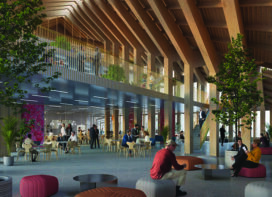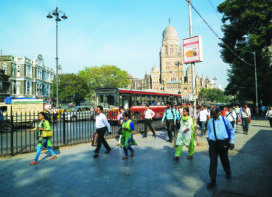
While a momentum for Smart City is achieved, the same needs to be accelerated through specific and continuous interventions at national regional and local levels from policy to performance management to take this journey forward and set the benchmark for rest of the cities to get started writes Venkata Chunduru, Director, IBI Group
About 55% of the world’s population today lives in urban areas. In India it is 34% increase of about three percentage points since the 2011 Census. It was well assimilated by our policy makers that managing this urbanisation in a smart way shall provide for a significant opportunity for renewing the cities to become growth engines and leapfrog Indian economy to greater prospects. But not without addressing in a sustainable way the problems emanating out of such urbanisation i.e. acute shortage of housing and growth of slums, increased traffic congestion, inadequate water supply and sanitation, growing pollution both water and air and finally inadequate social infrastructure i.e. schools and hospitals
Realizing the scarce availability of natural and financial resources, urban renewal in India was pivoted on Sustainability which became extremely important in this journey of transformation.
Launched in June 2015, Smart Cities Mission with an aim of developing 100 cities with an investment of Rs. 2.03 lakh Crores impacting nearly 22% of Urban India is definitely one of the most ambitious development programs ever conceptualised.
Urban India Conundrum
Before we embark on this, a quick look at India’s Urban predicament which will help us appreciate the efforts better.
Transformation Tales
As per the latest release from Government, tenders were issued for 1,686 projects worth more than Rs 63,000Cr in various smart cities, while 1,200 projects worth more than Rs 38,000Cr are under different stages of implementation. While the progress can be termed slow going by the numbers, but the transformation process that is kicked off as part of these projects is revolutionary in many ways. Some of the paradigm shifts that have emerged in the process shall lead to sustainability.
Citizen Centricity:
Starting from identifying the development priorities for the Cities to prioritisation and allocation of funds to design and implementation of solutions, citizens and their preferences are now central to all the decisions. Local municipalities reach out to its citizens listening to their needs and then applying technology-driven solutions to deliver services in most economical and sustainable way.
One prime example of citizen engagement is redevelopment of the old Jawahar Bazaar in Raipur, whose structurally weak walls posed a danger to the life and property of hundreds of shopkeepers and thousands of daily visitors. All stakeholders were called in and presented with different plans worked out by the authorities along with their pros and cons. Interestingly, all the 170 shopkeepers in the area had no objection to the project and willingly settled, as they were given the freedom of allocating their own shops within the legal framework. The result is one of the biggest market redevelopment projects undertaken by any of the smart cities in the country today!
Another remarkable people-powered initiative in the same city was the revolutionary 5am Army campaign, which brought together citizens of Raipur to wipe out the unsanitary practice of open defecation. It literally comprises an army of civilians who start work at 5 am every morning. Such had been the group’s effectiveness that the end of 2017 saw Raipur being officially declared ODF.
E-governance projects included public information dissemination, grievance redressal, electronic service delivery and citizen engagement through use of webportals or mobile apps or service Kiosks set-up at strategic public places across the cities. A pioneering mobile app is Smart City Vadodara created for the local municipality, envisions engaging citizens in development and addressing their grievances. The GPS-enabled app allows people in the city to raise issues by posting a message or sharing a photograph related to mismanagement of waste, dysfunctional city lights, encroachment on roads and even food adulteration. That’s not all, the app also allows users to file taxes, apply for tenders and check for government job vacancies.
Accountable authorities and citizens – Urban Partnership redefined: Smart Cities mission had made the transactions between citizens and city administrators transparent and hence engage them in a partnership to be jointly accountable for making their city liveable. One such example is the City of Indore which not only manages to process 100% of solid waste generated but also ensured 100% of its streets are litter free. The process of achieving this feat has been possible through an active engagement and partnership between the Indore Municipal authorities and the citizens. While authority engaged staff to clean city thrice a day, collect garbage twice from commercial areas and once from homes, citizens ensured garbage is being 100% segregated at source. Even slums and low income groups have learnt segregation and disposal in bins. Indore 311 app was deployed to enable citizens to communicate directly with their representatives to resolve issues with a 24-hour deadline, through a call centre managed by IMC. City mayor directly monitored the complaints, who also made surprise rounds to check waste disposal. Behavioural change which was essential element of whole story was made possible through active and sustained involvement by local NGOs coupled with heavy penal action and 24×7 monitoring by a authorities. Random raids were conducted at wee hours to check if residents were sneaking garbage on to streets. IMC staff worked 24×7 with no weekend leaves. While NGOs carried out extensive awareness drives via people-to-people contact, naming and shaming, discouraging open defecation through “dabba gangs”.
 TrafficInfraTech Magazine Linking People Places & Progress
TrafficInfraTech Magazine Linking People Places & Progress


